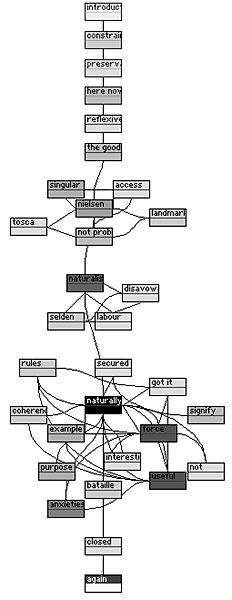
|
Landow argues that links in hypertext convey coherence, suggesting some sense of expressing a pre-existing connection or relation. However, coherence is produced by links, retrospectively, and this has been admirably shown in Douglas's Books Without End. In a delicate analysis of hypertextual sequence in Michael Joyce's Afternoon she writes:
"He asks slowly, savouring the question, dragging it out devilishly, meeting my eyes.'
< How . . . would you feel if I slept with your ex-wife?>
It is foolish. She detests young men."
The second time you read this, however, you might be convinced that you had read a different passage, and, by the third or fourth time, you might find yourself trying desperately to locate these different spots that sound awfully similar but seem to mean entirely different things. In one narrative strand, this segment crops up amid Wert's clowning around over lunch, emphasizing his immaturity around women. In another, Wert poses the question to Peter playfully, to distract him from his concern over the whereabouts of his missing son and estranged wife, whom he believes may have been injured in a car accident earlier that day. Encountered in yet another context, the passage occurs in the context of Peter's fling with a fellow employee, Nausicaa, and Peter sees Wert's question as evidence of his boss's jealousy over their involvement. Later, the lunch date and conversation reappear after a narrative strand couched in Nausicaa's own perspective, which reveals that she is sleeping with both Wert and Peter, making Wert's query something of a game of cat's-paw. "I'm sleeping with your lover," Wert seems to be thinking, so he follows the line of thought to a position he perceives as more daring: "What if I were sleeping with your ex-wife?" But if you reach a segment called "white afternoon," having visited a fairly detailed series of places, you will discover that Wert and Peter's ex-wife, Lisa, have been seen together by Peter himself, although Peter cannot be certain that they are involved with each other. When the lunch time conversation reappears, after this last revelation, Wert's query is a very real question indeed. (58)[Quotes are from Joyce's Afternoon]
Clearly in this example coherence (and narrative sequence) is generated by the links, and while the distinction between 'conveyed' and 'generated' may appear insignificant, it in fact represents a paradigmatic difference in how the link is conceived. "Conveyance" tends to suggest the delivery of a pre-existing entity, whereas 'generation' or 'production' grants the link a constitutive force in this process.
Furthermore, hypertext which may also seek multilinearity (and if not multilinearity then certainly repetition of content) clearly requires links to no longer convey, but in fact to build, coherence (Rosenberg, Miles "Syntagmas") as nodes become moments of hesitation along the various alternative syntagmatic pathways produced by link architectures.
|